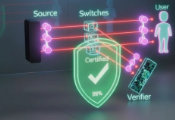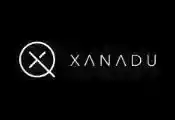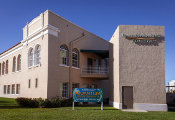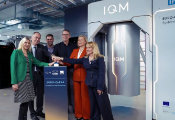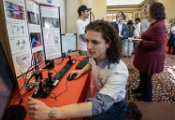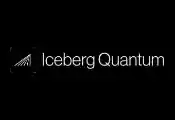Qolab Spearheads Hardware Development for DARPA’s Quantum Benchmark Initiative
Madison, Wisconsin, April 10, 2025 -- Qolab, today announced its participation in the U.S. Defense Advanced Research Projects Agency (DARPA) Quantum Benchmarking Initiative (QBI) as a co-leader, together with Hewlett Packard Enterprise (HPE), of a consortium that is building a quantum supercomputer. Qolab is spearheading the hardware development of the consortium, focusing on designing and fabrication of the quantum processors.
The QBI program aims to determine the feasibility of building an industrially useful quantum computer much faster than conventional predictions, with a goal of developing such a computer by 2033. As part of this initiative, Qolab is leveraging its deep expertise in quantum physics and its collaborators in the semiconductor industry to overcome the critical scaling challenges in quantum computing.
“We are thrilled to be at the forefront of hardware development for this groundbreaking initiative,” said Dr. John Martinis, CTO of Qolab and the pioneer of developing the flux-tunable transmon and couplers, key components in modern superconducting qubit systems. “Our focus is on fabricating high-quality superconducting qubits leveraging the latest tools the semiconductor industry has to offer. We recognize the critical need for significant improvements in qubit fabrication, and we are dedicated to overcoming these challenges with our collaborators.”
In this consortium, Prof. Martinis is leading all quantum hardware efforts, including design and fabrication of qubits, control electronics, and system engineering. Dr. Masoud Mohseni, distinguished technologist at Hewlett Packard Enterprise, is leading full-stack software developments including quantum algorithms, quantum error-correction, heterogeneous hybrid quantum-classical architectures, quantum applications and benchmarking. “By bringing together the best minds and technologies in the field, we are confident that we can accelerate the development of quantum computing,” Dr. Mohseni added. “Our team is committed to pushing the boundaries of what is possible and delivering the solutions that will power the future of quantum computing.”
“We are excited to work with our collaborators to build high-performance quantum-classical coprocessors,” Dr. Martinis explained. “This collaborative effort will allow us to design and test high-quality quantum components and system integration at all intermediate scales with accelerated pace and reduced cost.”
Qolab is working alongside a diverse group of collaborators including large semiconductor companies, startups, universities, and national labs where their expertise and contributions are highlighted below:
Hewlett Packard Enterprise: Hybrid High Performance Computing
HPE partners with Qolab to integrate quantum computing with classical supercomputing, leveraging their extensive experience in high-performance computing to develop robust and scalable quantum systems. This collaboration aims to create hybrid solutions that can address complex computational problems more efficiently.
Applied Materials: Material development and wafer-level fabrication
Applied Materials leverages its expertise in materials engineering, advanced packaging, and nanofabrication to drive innovations in quantum computing. By collaborating across the ecosystem, the company is advancing the development of superconducting qubits with improved error rates and uniformity, supporting the scalability of next-generation quantum architectures. The collaboration with the consortium highlights Applied’s commitment to accelerating solutions for scalable quantum computing through its leadership in materials engineering and manufacturing.
Synopsys: Modeling and simulation, EDA tools and semiconductor IP
With decades of experience in solving engineering complexity and delivering breakthroughs from silicon to systems, Synopsys is contributing its industry-leading expertise in modeling and simulation, design automation, semiconductor IP, and cryoCMOS design to help realize scalable quantum computing solutions. Synopsys can drive the evolution of quantum computing technology toward market readiness by addressing challenges in qubit design, fabrication, algorithms, and applications.
Qolab: Qubit and circuit design
Qolab is spearheading the hardware development for the consortium, focusing on fabrication and control electronics. Leveraging its deep expertise in quantum physics and the capabilities of the semiconductor industry, Qolab is driving rapid advancements in scaling superconducting qubits. Recognizing the critical need for significant improvements in qubit fabrication, Qolab is dedicated to overcoming these challenges to enable the development of commercially viable quantum computers.
Quantum Machines: Quantum hardware control and real-time quantum error correction
Quantum Machines (QM) is a leading provider of quantum control solutions, driving the advancement of quantum computing with its Hybrid Control approach. By harmonizing quantum and classical operations, Hybrid Control eliminates friction and optimizes performance across hardware and software, enabling researchers and builders to iterate at speed, resolve setbacks, and bring visionary ideas to life. Its platform supports any type of quantum processor, empowering the industry to scale systems, accelerate breakthroughs, and push boundaries.
1QBit: Fault-tolerant quantum error correction design and simulations, quantum algorithm compilation, and automated resource estimations
1QBit is advancing the field of quantum computing through benchmarking studies that assess the impact of quantum hardware specifications, such as noise characteristics and manufacturing imperfections, on the resources required for utility-scale quantum computers. Using its Topological Quantum Architecture Design (TopQAD) software suite, 1QBit analyzes hardware characteristics, fault-tolerant quantum computing (FTQC) protocols, quantum error correction, and quantum networking requirements. This comprehensive approach supports the efficient design and simulation of scalable quantum architectures.
University of Wisconsin: Algorithms, benchmarks
Professor Matthew Otten, a quantum benchmarking expert from the University of Wisconsin, plays a pivotal role in assessing the progress of the consortium toward quantum advantage for utility-scale applications. His expertise in quantum algorithms is also instrumental in driving the consortium’s objectives forward.


